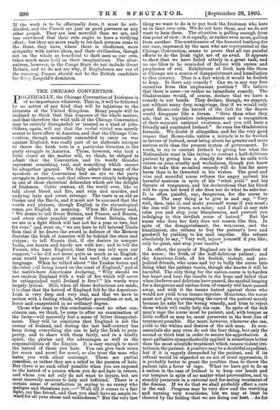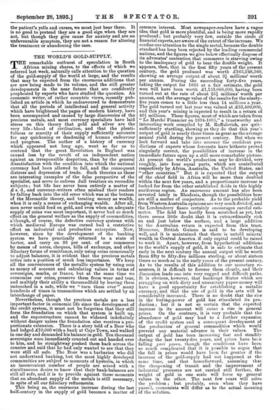THE CHICAGO CONVENTION.
POLITICALLY, the Chicago Convention of Irishmen is of no importance whatever. That is, it will be followed by no action of any kind that will be injurious to the interests of the United Kingdom. Many people will be inclined to think that this disposes of the whole matter, and that therefore the wild talk of the Chicago Convention may be entirely disregarded or treated as a kind of joke. Others, again, will say that the verbal vitriol was merely meant to have effect in America, and that the Chicago Con- vention, though nominally assembled to carry on war against England, was really part of an elaborate intrigue to throw the Irish vote in a particular direction in the party struggle in America. Those, however, who look a little closer at the matter will, we think, be obliged to admit that the Convention and its wordy thunder represent something real, and something which cannot be altogether ignored. We fully admit that many of the speakers at the Convention had an eye to the party struggle in America, and that others were simply indulging in one of those rhetorical debauches which are the delight of Irishmen. Celtic orators, all the world over, like to talk about blood and fire, and ruin and murder, and undying hate and sweet revenge. The taste is as old as Ossian and the Bards, and it must not be assumed that the words and phrases, though English in the etymological sense, are English in meaning. When Mr. Finerty said, " We desire to tell Great Britain, and France, and Russia, and every other possible enemy of Great Britain, that we are in a fight which will last not for a year or two, but for ever," and went on, " we are here to tell beloved Uncle Sam that if he draws the sword in defence of the Monroe doctrine the Irish of America will be behind the stars and stripes ; to tell Russia that, if she desires to conquer India, our hearts and hands are with her ; and to tell the French, who hate England, that they can rely upon our support,"—he did not mean quite as much as an English- man would have meant if he had used the same sort of language. When he talked about " the Yankee huzza and the rebel yell being heard on the coast of England," and of the native-born Americans declaring, " Why should we not encircle England with a wall of fire which will never be extinguished until Ireland is free?" his words were largely lyrical. Still, when all these deductions are made, it is clear that the hatred of England felt by the American- Irish is very deep and very real, and that we have to reckon with a feeling which, whether groundless or not, is fierce and exasperated in no ordinary degree. Those who come to this conclusion—and no other con- clusion can, we think, be come to after an examination of the facts—will naturally feel a sense of bitter disappoint- ment. They will be conscious that England is not the enemy of Ireland, and during the last half-century has been doing everything she can to help the Irish to pros- perity, and to share with them fairly, and in a kindly spirit, the glories and the advantages as well as the responsibilities of the Empire. It is easy enough to meet the hatred of those you hate. You can give back scorn for scorn and scowl for scowl, or else treat the man who hates you with silent contempt. These are partial remedies, or rather they are a relief to the passion of hate. But there is no such relief possible when you are exposed to the hatred of a person whom you do not hate in return, and whom you not only do not want to injure, but are most sincerely anxious to help and befriend. There is a certain sense of satisfaction in saying to an enemy who maligns and threatens you :—" Wait till it comes to a fair fight, my fine friend, and then you shall have an ample re- ward for all your abuse and unkindness." But the very last thing we want to do is to pay back the Irishmen who hate us in their own coin. We do not hate them, and we do not want to hate them. The situation is galling enough from this point of view ; it is equally, or rather even more, galling from another. The continuance of the frenzied loathing for our race, expressed by the men who are represented at the Chicago Convention, seems to prove that all our painful efforts to do the Irish right are of no avail. It appears to show that we have failed utterly in a great task, and no one likes to be reminded of failure with curses and prophecies of evil. Exhibitions of Irish hate like those at Chicago are a source of disappointment and humiliation to this country. That is a fact which it would be foolish to deny. Is there any remedy ? Can we in any way free ourselves from this unpleasant position ? We believe that there is none—or rather no immediate remedy. The Gladstonians would, of course, declare that we have a remedy to our hands. They declare, though, we suspect, not without many deep misgivings, that if we would only grant Home-rule the hatred of the Celt for the Saxon would disappear like a dream. " Give them what they ask, that is, legislative independence and a recognition of their separate national existence, and you will have a friendly and contented Ireland." So runs the Gladstonian formula. We doubt it altogether, and for the very good reason that Home-rule, unless a miracle is to be worked in favour of Ireland, must bring about far greater and more serious evils than the present system of government. In truth, to try to content Ireland by giving her what the Nationalists want is like trying to content a half-delirious patient by giving him a remedy for which he calls with curses on your cruelty and wickedness, though you know that to take this so-called remedy will do him far more harm than to be thwarted in his wishes. The good and wise and merciful nurse refuses the angry patient his harmful nostrum in spite of his "rebel yells " and his threats of vengeance, and his declarations that his blood will be upon her head if she does not do what he asks her. It is often painful, nay, dangerous, for the nurse to refuse. The easy thing is to give in and say, " Very well, then, take it, and make yourself worse if you must ; the loss will be yours, not mine ; and I shall at any rate calm you and stop your blasphemies, and prevent you indulging in this devilish sense of hatred." But the nurse who does her duty does not reason like this. In spite of the disappointment, the weariness, and the humiliation, she refuses to buy the patient's love and goodwill by yielding to his mad impulse. She refuses absolutely to say, " Very well, injure yourself if you like ; only be quiet, and stop your insults."
In effect, the people of England are in the position of the nurse ; the Irish, of the half-delirious patient ; and the American-Irish, of his foolish, violent, and pre- judiced friends, who come and try to bully the nurse into doing what the patient wants, though she knows it will be harmful. The only thing for the nation-nurse is to harden her heart and bear the insults in the hope and belief that when the fever and delirium have passed, the morbid longing for a dangerous and useless form of remedy will have passed away, and with it the insane hatred against those who would not yield to an insane impulse. Meantime, the nurse must not give up attempting the cure of the patient merely because he asks for the wrong remedy, and tries to reject those which will really help his case. In spite of the sick man's rage the nurse must be patient, and, with temper as little ruffled as may be, must persevere in the best line of treatment possible. She must, however, wherever she can, yield to the whims and desires of the sick man. In non- essentials she may even do not the best thing, but only the second or third best in order to secure his approbation. A mere palliative sympathetically applied is sometimes better than the most scientific treatment which causes violent irri- tation in the patient. A poultice may be a doubtful expedient, but if it is eagerly demanded by the patient, and if its refusal would be regarded as an act of cruel oppression, it is probably better to grant the poultice than to throw the patient into a fever of rage. What we have got to do as a nation in the case of Ireland is to keep our heads and our tempers in spite of no matter what provocation, and to steadily persevere in a rational and far-seeing treatment of the disease. If we do that we shall probably effect a cure in the end. Progress may be very slow and the watching and nursing very wearisome, but we may at least be cheered by the feeling that we are doing our best. _ As for the patient's yells and curses, we must just bear them. It is no good to pretend they are a good sign when they are not, but though they give cause for anxiety and are an unfavourable symptom, they are not a reason for altering the treatment or abandoning the case.







































 Previous page
Previous page